|
|
||||||||||||||||||||||||||||||||||||||||||||||||||||||||||||||||||||||||||||||
Celebration of Life Photo Gallery
|
|
Celebration of Life Photo
Gallery
Butch's
life celebrated
in grand style
By
Tom Ineck
LINCOLN,
Neb.—Hundreds of Butch Berman's friends,
family and fans were on hand March 23
for the six-hour celebration of the life
of the legendary Lincoln musician and
founder of the Berman Music Foundation.
The main
ballroom of The Cornhusker Marriott
Hotel in downtown Lincoln swarmed with
fellow musicians, family members,
associates of the foundation and other
folks who were touched in some way by
the ebullient lover of life, who died
Jan. 31 at age 58. Those in attendance
expressed a mixture of joy and
sadness—joy that they had known Butch
and sadness that he was not able to
share this grand event in his honor.
Both
jazz and rock musicians paid their
sincerest respects by participating in
the Easter Day celebration of life, with
jazz music relegated to the 4-7 p.m.
slot and rock music extending well past
the scheduled 10 p.m. closing time.
The
stellar Kansas City rhythm section of
pianist Joe Cartwright, bassist Gerald
Spaits and drummer Ray DeMarchi set the
mood for the afternoon with
Headliner Karrin Allyson, the first
artist that the Berman Music Foundation
brought to Lincoln—back in March
1995—performed a stunning set that
included the appropriate "Live for Life"
and Randy Newman’s “Guilty,” which she
recorded on her 1992 Concord Records
debut, “I Didn’t Know About You.”
Cartwright and company gave a wonderful
reading of a bop tune that was one of
Butch’s favorites, Charlie Parker’s
“Yardbird Suite.”
To begin
the segue from jazz to rock, The
Lightning Bugs contributed a set of
their trademark swing, with vocals
inspired by the sweet harmonies of the
Mills Brothers. Among the classics of
the genre performed by guitarist Steve
Hanson, bassist Jim Pipher and drummer
Reynold Peterson were “Glow Worm,”
“Satin Doll” and “Moonglow.” For Butch’s
widow, Grace Sankey Berman, they
dedicated the touching “Be My Life’s
Companion.”
Of
course, any celebration of Butch’s life
and love of music would have been
incomplete without the participation of
legendary rockabilly singer and
songwriter Charlie Burton, who was
accompanied by fiddler Dave Fowler,
bassist Dave Boye, drummer Dave Robel,
and special guest Steve Hanson on
guitar. Appropriately, their set
included “Rock ‘n’ Roll Behavior” and
“Guitar Case,” tunes first recorded by
Charlie Burton and Rock Therapy (with
Butch on guitar) in 1976 and 1977,
respectively.
Last,
but not least, the surviving members of
the Cronin Brothers, Butch's last band,
took the stage for a very personal
tribute to their fallen comrade. With
Butch’s beloved Telecaster on display at
the front of the stage, cohorts Bill
Lohrberg on guitar, Craig Kingery on
bass and Don Holmquist on drums carried
on like troopers, with Brian Hull capably
taking on the keyboard chores once
handled by Butch. Kelly McGovern and
special guest Sean Benjamin contributed
additional vocal and guitar.
Early
on, the Cronins performed “Trinidad
Rocks,” a rocking instrumental written
by Butch many years ago. Then it was
time for their own take on classic rock,
with great renditions of “Dirty Water,”
“Five O’clock World,” “Little Sister,”
“Peter Gunn,” “Secret Agent Man,” “Slow
Down,” “Sleep Walkin’,” and “Lucille”
McGovern delivered impassioned vocals on
the bluesy “One Way Out” and the Traffic
masterpiece “Feelin’ Alright.”
Between
sets of music, friends took the stage to
share stories at the microphone. Among
them was Arleen Fowler, who related her
long experience with The Famous, the
women’s ready-to-wear shop where she
worked for the Berman family from 1948
until it closed Jan. 31, 1976. She
recalled the day in March 1949 when she
first heard the news that Byron Lee
Berman had been born to Harriett and
Alfred Berman.
Most
touchingly, Grace
took the microphone to thank everyone
for showing their love and
support—especially the participating
musicians, who gave the greatest gift of
all. May the music never end.
Hundreds gather to celebrate Butch's
life
Gerald Spaits
Joe Cartwright
Ahmad Alaadeen
Dawn DeBlaze
Kay Davis and
Terry Schwimmer
Alan Smith, Warren Rudolph
and Marthaellen Florence
Photos
by
Rich
Hoover Tony and Tami Rager with their children, Lexie and
Joey
Family and friends of
Grace Sankey-Berman
Dave Robel and Don Holmquist
Jayne Sebby, Deb Higuchi and Tad
Fraizer
Grace Sankey-Berman
expresses her thanks.
Ray DeMarchi
and Joe
Cartwright
Doug Fenton
and Dave Landis Ed Love and
John Horn
Lightning Bugs Jim Pipher,
Reynold
Peterson and Steve Hanson
Gale Cooper, Richard Sullivan
and Tom Dayton
Tribute to wonderful husband, music
lover, promoter
By Grace Sankey-Berman
We found
each other at a time when we were both
ready for a serious relationship. My
kids and I were very happy because Butch
fit right in and we became a family.
Butch was totally committed and did not
shy away from the responsibilities that
came with a new family. He became
protective of us and provided for our
every need in the best possible way. He
loved my kids and tried to be a good
male influence to the boys. As a result,
he has made a lasting and positive
impact in our lives.
But on
Jan. 31, I lost my husband and lover. I
could not have written this sooner
because the pain was very intense and
the emptiness I felt was deep. It is
still hard to grasp that Butch is gone,
and the finality of his death is
immensely difficult to deal with. Butch
was a free thinker who loved and
celebrated life and I would like to
honor that legacy. He lived and loved
passionately and I feel privileged to
have been a part of his life, no matter
how briefly it seems.
Butch
clamored for information about music and
musicians and was well versed with all
the details of their art and lives. His
radio shows were like music history
classes, but more entertaining and
in-depth. He played great music and
would talk to his audience about the
musicians and their musical journey and
about the artist as man or woman. In
other words he tried to humanize these
great musicians. I regret not paying
more attention to the wealth of
information he tried to share with me.
May be it did not cross my mind that he
would depart so early.
His
passion for music can also be seen in
how well-organized the BMF museum, which
is in his house, is kept. Even though he
had thousands of records, Butch knew
exactly where to find almost every one
of them. He handled each record or CD
very carefully, as if it was the last
one. Every record was meticulously
cleaned and preserved. He worked with
almost surgical precision arranging and
rearranging stacks of records and CDs
and loved every minute of it. He derived
a lot of satisfaction from the knowledge
that everything was in order.
Butch
listened to music constantly in his
house and in the car. His musical palate
included rock ‘n’ roll, soul, country,
jazz and every thing in between. He was
an equal-opportunity music lover. But
most of all he enjoyed playing and
making music with other musicians. Some
of his best memories included playing
with Charlie Burton, Dave Robel and Otto
Spalti in The Megatones. Even in later
years, he was always tickled and excited
at any opportunity to play with those
guys. Of course, he had a lot of fun
playing with many other musicians, like
his last band, The Cronin Brothers, who
were kind enough to play at Butch’s
celebration of life on March 23. I had a
lot of fun the last few years listening
and dancing to their music. Not only did
he enjoy playing with other musicians,
but he looked forward to the camaraderie
with them. He continued to practice with
The Cronin Brothers up to just two weeks
before his death. He was not about to
let a damned tumor stop him from
playing. He kept practicing and planning
for the next gig, which was a few days
away. But it was not meant to be. That
is the kind of guy Butch was, an eternal
optimist.
Butch
was a good friend. I know because he was
my best friend. Most of his friendships
were life-long. He spent countless hours
on the phone talking with his friends,
such as Wade Wright in San Francisco. I
was always amazed at how well he
nurtured his friends, constantly keeping
in touch with them, remembering their
birthdays and spending time with them
whenever possible. He enjoyed fried
chicken and good food with his friend
Rich on Thursday nights. He loved the
game of Ping Pong and looked forward to
Saturdays when he played with his
friends Brad Krieger and Daniel Nelson
for many years. Butch was always
thoughtful and generous. He spent the
last days of his life planning a benefit
concert for his dear friend Norman
Hedman, who is currently in remission
from cancer. He was worried about
Norman’s illness, but never complained
about his own illness. That benefit took
place April 14 in New York.
I am
comforted by the fact that Butch lived a
happy, full life without compromise. I am
touched by the outpouring of support
from friends and strangers. A lot of you
have reached out to me at this difficult
time by phone, cards, letters and
visits. I want to say thank you for
every thing you have done. Many of you
brought meals or took me out and made
sure that I ate. Your care and support
has been of immense help to me.
Butch
was loved and touched by many. I got
notes from total strangers who were
touched when they read about his passing
in the paper. Some joined us to
celebrate his life. Arleen Fowler, a
delightful lady whom I had never met
before, came by Butch’s house when she
heard about his passing. She informed me
that she was the secretary at The
Famous, a ready-to-wear store owned by
the Berman family from 1946 to 1976. She
took time to tell me about Butch’s
family. She had known Butch from birth
and had watched him grow up while she
worked at The Famous. She obviously was
fond of him and enjoyed his sense of
humor and wit. She could not get over
how talented he was and how his ideas
were not always what his mom wanted, but
he believed in himself enough to stick
to his own beliefs.
That is
essentially the core of the man I knew,
fell in love with and married. He was
not afraid to go against rigid
sub-cultures, regardless of the price he
may pay. He taught me that to be an
individual or to be vulnerable is
empowering, not diminishing. That was
the key to him having such a happy life.
Therefore, Butch remained honest almost
to a fault. He did not make a lot of
friends that way. But in his style, he
always managed to get people he dealt
with to come around, even if they only
agreed to disagree. He was the first to
reach out and apologize for anything
necessary.
Thanks
to all the musicians who donated their
time to play at the celebration of
Butch’s life. Special thanks to The
Cronin Brothers, his fellow bandmates
who worked hard to make Butch’s day
special. Butch was proud to play with
such great guys. Thanks to Michael Opoku
and Ashanti African Root band for
playing the African drums that Butch
loved so much, to Kansas City musicians
Gerald Spaits, Joe Cartwright, Ray
DeMarchi, and Alaadeen for taking time
from their busy schedules to play great
jazz and to Karrin Allyson, who graced
us with her presence and great music. To
all the Lincoln musicians, I want to
thank you for all you did. I am sure
Butch was watching and loved every
minute.
Most
importantly, I wish to thank all the
care providers who were at the
frontline, working to make Butch
comfortable during his illness. They
came by to see Butch at home after busy
days in the office. They include Dr.
Kevin Coughlin, Butch’s personal
physician, the “hippest doctor in town,”
as Butch liked to say; Dr. David Lauer,
his chiropractor, who understood Butch
very well; Kassi Riordan, Butch’s missus
who is the most generous person I know;
and Joyce Latrom, Butch’s longtime
friend, who was always generous and
willing to lend a hand or a shoulder to
cry on.
To the
BMF family, I thank you for making it a
lot easier for me and Butch. Thank you,
Tony Rager and Kay, for helping me keep
it all together. I also wish to thank
Tom Ineck for working tirelessly to keep
the website updated. Your thoughtfulness
and hard work over the last few months
have not gone unnoticed. Butch and I
enjoyed your radio show immensely, and
we greatly appreciated the dedications
you made to Butch. Thanks to Ruthann,
Paul, and Matt, who spent hours to put
together the slide pictorial for the
celebration of life.
Special
thanks to my friends Kim Jasung, Rose
Spencer, Cathy Moss and Mousa Drammeh
for being there when I needed them the
most.
I feel
privileged to have been married to
Butch. He was a great husband who did
his best to navigate through this
journey called life. I love you,
darling, and miss you dearly. I remain
eternally grateful for having been loved
by you. Rest in peace, my love.
2008 Jazz in June dedicated to Butch
Berman
By Tom Ineck
LINCOLN,
Neb.—Butch Berman devoted much of his
final days to future plans—an April 14
benefit for Norman Hedman in New York
City, a May 23 salute by the Nebraska
Jazz Orchestra to the music of Russ
Long, and the upcoming Jazz in June
outdoor concert series.
Though
his death on Jan. 31 prevented him from
experiencing these events, the Berman
Music Foundation will continue to
carry on his vision by participating in
Jazz in June for the first time since
2004, when the BMF sponsored the Eldar
Djangirov Trio and the Kendra Shank
Quartet. To show its appreciation for
the BMF support through the years, the
Jazz in June folks are dedicating the
2008 series to Butch Berman.
"For more than 10 years, the Berman
Music Foundation has served as a valued
partner, team member and stakeholder to
the Jazz in June music series," said
Marthaellen Florence, chair of Jazz in
June. "Under the tutelage of Butch
Berman, Jazz in June was able to bring
many of the nation's most accomplished
jazz artist to the stage. With the
foundation's generous contributions Jazz
in June audiences have been afforded the
opportunity to experience outstanding
talent and the community's has been
educated through countless artist's
workshops."
Before each
performance this year, someone from the
Lincoln jazz community will make a few
remarks about Butch, his contribution to
jazz in Lincoln and to Jazz in June.
Again,
the foundation will fund two of the four
artists on the 2008 line-up—the Dan
Thomas Quintet on June 10 and the
Dynamic Les DeMerle Band, featuring
singer Bonnie Eisele, on June 17. The
other artists are the Darryl White Group
on June 3 and the Lao Tizer Band on June
24.
"Jazz in June
continues to value contributions of BMF
and Butch Berman," Florence said. "We
also recognize that there was a great
value in Butch's decision to engage his
foundation in the philanthropic process.
When those who share a commitment to one
another share an equally heartfelt
commitment to something beyond the
community both are enhanced."
A jazz
educator teaching saxophone and jazz
history at the University of
Missouri-Kansas City, Dan Thomas has
been a favorite of the foundation for
several years. He performed with his
group in September 2004, as part of the
Berman Jazz Series in Topeka, Kan. (for
a review
click
here) His recording “City Scope” was
reviewed that same year (click
here), and “Musical Sanctuary” was
reviewed on its release the following
year (click
here). The Canadian-born jazz
educator also was the subject of a
feature interview in the August 2004
edition of the BMF newsletter (click
here).
The Dan
Thomas Quintet includes Joe Parisi on
trumpet and flugelhorn, Brandon Draper
on drums, Roger Wilder on piano and Bram
Wijnands on
bass, in
addition to Thomas on saxophone.
A
Brooklyn native, drummer Les DeMerle
toured 12 years with big band trumpet
master Harry James and has played with
the likes of Lionel Hampton, The
Manhattan Transfer and Red Allen.
Vocalist Bonnie Eisele, DeMerle’s wife,
specializes in renditions of jazz
classics and breezy Brazilian ballads.
The Florida-based band also features
pianist Mike Levine and bassist Jamie
Ousley.
This
year’s wild card is young keyboard whiz
Lao Tizer, whose 2006 release,
“Diversity,” displays his broad
influences while remaining rooted in his
smooth jazz style. The album reached
Billboard’s Top 50 Contemporary Jazz
chart. Backed by a handpicked band, he
has performed with Isaac Hayes, Wayne
Shorter, George Benson, The Rippingtons,
Bruce Hornsby and Spyro Gyra.
Jazz in
June 2008 promises to be a welcomed
return for the Berman Music Foundation.
BMF attends April 14 benefit for Norman
Hedman
By Tom Ineck
NEW
YORK, N.Y.—When Butch Berman heard the
news that his good friend, master
conguero and Berman Music Foundation
consultant Norman Hedman was ill, he
began to help with plans to sponsor a
benefit concert to defray some of
Hedman’s growing medical expenses.
Unfortunately, Butch himself was unable
to attend the April 14 benefit concert.
He died Jan. 31.
The
support for Norman in his time of need
was inspiring. Often struggling with
their own financial worries, the
generous musicians of New York rallied
around their comrade to perform for
“Rhythm Relief,” a two-show event at
Jazz Standard, 116 E. 27th
St. Hosted by WBGO Radio’s Rob Crocker,
the event was produced and sponsored by
8 Bar Management and the Berman Music
Foundation.
On the
day before the benefit, we were able to
visit with Norman for an hour or so at
his midtown Manhattan high-rise, his
residence of many years. At his side
were his wife, Michelline, and his
manager and friend Dawn DeBlaze of 8 Bar
Management. Joining us later was drummer
and upstairs neighbor Horacee Arnold and
Andrienne Wilson, singer-flutist and
longtime friend of Norman’s, who had
just arrived from her home in the
Pacific Northwest.
Though
much thinner than the last time we had
seen him, Norman was in his usual high
spirits, despite having completed a
six-week series of cancer treatments and
preparing for yet another. Downplaying
his own dire condition, he expressed
sadness at the sight of so many children
with cancer at Sloan-Kettering, noting
that he had already lived a full life, but
that they had barely begun theirs.
Because
of his compromised immune system, Norman
could not attend his own benefit for
fear of possible air-borne infection.
But his presence was palpable that
night, as so many friends and fellow
musicians gathered to show their love
and support.
Opening
their wonderful set was “Hed-Theme,”
from the BMF-sponsored CD “One Step
Closer,” released in 1999. Andrienne
Wilson joined the band on flute for the
Hedman theme song, which also received
nice solo statements from Misha Tsiganov
on piano, Roger Byams on alto sax and
Alexei Tsiganov on vibes.
Queen
Esther Marrow, a versatile blues, jazz
and gospel singer who has
Tropique
returned to the stage for a first-show
finale featuring a percussion ensemble
that included Martinez, Steve Kroon, Ray
Mantilla and Chembo Corniel churning the
polyrhythmic waters of Mongo
Santamaria’s “Afro-Blue.”
As
always, Martinez was the master of poise
and sensitivity, managing the
On
behalf of representatives of the Berman
Music Foundation who were in attendance
(Grace Sankey-Berman, Tony Rager, Kay
Davis and myself), I thank everyone
involved, especially Norman Hedman for
his resilient spirit and all the
musicians who donated their time and
talent for the cause.
Editor's Note: The latest on
Norman's condition is that he has
completed two chemotherapy
treatments, arriving home May 26
after four weeks in the hospital. He
is still very susceptible to illness
and will undergo tests to determine
if he is still in remission. If so,
he and his sister will begin bone
marrow transplantation at the end of
June or July.
Norman
sends his thanks to the Berman Music
Foundation for the support of
“Rhythm Relief.” The concert,
auction and donations have so far
netted $7,571. If you wish to
donate, visit
www.normanhedman.com and click
on "Rhythm Relief Fund."
Springtime in New York is the season of
change
By Tom Ineck
NEW
YORK, N.Y.—Springtime in New York is
legendary for good reason. It is the
season of rebirth and rejuvenation in
the most exciting city on the planet.
But with hopefulness comes an inevitable
sense of change, the rather discomfiting
sensation of living on the cusp of an
unknown future.
So it
was with mixed emotions that the Berman
Music Foundation entourage arrived April
12 in the great metropolis to attend an
April 14 benefit concert for the ailing
Norman Hedman. Without our dear friend
and BMF founder Butch Berman at our side
and with just three nights and two full
days in the city, we were determined to
make the most of our brief stay.
On our
arrival Saturday, we checked into our
rooms at the venerable Park Central
Hotel near 57th and Seventh
Avenue, and then headed to a nearby
Italian restaurant to meet Russ. With
his usual enthusiasm and encyclopedic
Russ
shifted into high gear Sunday, herding
the BMF party to the subway for a ride
to the Staten Island Ferry. From there,
despite overcast skies, we would get a
decent view of the Statue of Liberty and
the city skyline before returning to
Lower Manhattan. We strolled through
Battery Park and visited Trinity Church
and St. Paul’s Chapel, which
miraculously survived the collapse of
the nearby World Trade Center towers in
2001. We maneuvered our way through the
milling crowd on Wall Street, past the
art deco Woolworth Building (closed to
tourists), to our jazz brunch
destination, Café Loup, at 105 W. 13th
St.
That
evening, we attended “Rent” at the
Nederlander Threatre, where it is
scheduled to close Sept. 7 after an
amazing 12-year run of some 5,000
performances. That will make it the
seventh-longest-running Broadway show in
history. Despite its undeniable
financial success, I found it only
slightly memorable. As they say,
everyone’s a critic.
Among
the tunes they played were “Mambo
America,” “Cantina,” and “Pure Emotion,”
the title track of a 1995 release. On
this occasion, it was dedicated to
Arturo’s mother, Lupe O’Farrill, who was
sitting at the bar next to us. “Samba
for Carmen” was dedicated to the memory
of Carmen McRae,” and “Something to
Smoke” was an aptly hot number.
The next
day, we were headed home. We had,
indeed, made the most of our first
springtime in New York.
Understanding the sweet mystery of life
By Ruth Thone
Surely I
would be helped, or at least able to
lighten up, if I simply considered death
and dying a mystery, instead of
intermittently felled by that fact of
existence.
We all
know, do we not, that all lives end in
death, that fair price for the beauty
and tragedy of living.
What I
don’t get is why it’s so hard, why each
new death in our short and sweet
existence feels like an unimaginable
wound.
A good
friend left us, as we sometimes say,
this winter after an accurate death
sentence of four months, due to a
malignant, inoperable brain tumor. He
chose to live life cheerfully at the
end—telling me that “being positive is
hard work,” to which I agreed, telling
him that I don’t even try.
A few
off his friends, including me, knew of
the four-month diagnosis but he did not
want to talk about it endlessly or have
to console his grieving friends during
his last few months. Even so, I was
shocked at his death, thrown into
startling and uncomfortable grief.
One of
the operating systems we all have in our
characters is that of denial. Mine had
certainly kicked into high gear as he
and I visited once a week in the office
of our friend and massage therapist, and
at lunch with the four of us, old friend
and his lovely wife, and therapist and
myself. We’d been meeting for a Monday
noon lunch a few times a year for
several years.
My
massage therapist friend called to tell
me our friend had died the night before,
so I’d not be more shocked to walk into
my weekly appointment, to discover that
he was no longer with us.
Still, I
have struggled with his death. Now I
think of bidding farewell to him and his
wife as we parted after lunch that day
less than three weeks before he died.
Never once did I think that would be the
last time I would see him.
Another
old friend tells of sitting at her dying
unconscious father’s bedside, reading
the “Tibetan Book of the Dead.” Another
lent me her copy of “Good Life Good
Death,” written by her Buddhist teacher
Gelek Rinpoche.
My
childhood Christian Science told me that
“Sin, sickness, disease and death are
unreal.” I know our old friend, in an
African tradition, will be with us as
long as the last person to know him is
alive.
What I
discover each day is the blank place he
used to occupy, that vital, vibrant,
joyously alive man.
My old
friend existed with his beloved wife,
Grace, in the world of his obsessions,
as we all do, and that off loving
friends, and richly in his enormous and
generous devotion to jazz music.
I hate
to whine; we all face death, lots of it
as we age, and meet our friends at
funerals. Maybe this death was just the
tipping point for me, after a year of
many losses.
Maybe
struggling with loss and grief is simply
what we are required to experience in
exchange for the gift of life.
Ruth
Thone, author of “Women and Aging,
Celebrating Ourselves,” “FAT: A Fate
Worse than Death,” “Women, Weight and
Appearances,” and “Being Home,” can be
reached at ruththone@msn.com. This
article first appeared in the March 22
edition of Neighborhood Extra. It is
reprinted here with the author’s
permission.
BMF donates 200 CDs to Lincoln Public
Schools
LINCOLN,
Neb.—The Berman Music Foundation (BMF)
recently donated 200 jazz CDs to Lincoln
Public Schools to be used for music
education in the city’s 10 middle
schools.
The CDs
are copies of the 2001 release “Never
Let Me Go” by the Russ Long Trio of
Kansas City, Mo., for which the BMF
provided essential funding. With this
gift to Lincoln Public Schools, funding
for the NJO concert, and support for
this year’s Jazz in June concert series,
the Berman Music Foundation rededicates
itself to the preservation and promotion
of jazz music in Lincoln, despite the
recent death of BMF founder Byron L.
“Butch” Berman. Berman, 58, died Jan. 31
after a four-month struggle with brain
cancer.
Since
its inception in spring 1995, the BMF
has sponsored dozens of jazz concerts
throughout the Midwest. It has funded
many recordings and maintains a local
museum that includes a library
containing thousands of music
recordings, videos, books and magazines.
Editor’s Note:
At your request, we will mail a printed version
of the newsletter. The online newsletter also is available at this
website in PDF format for printing. Just click here: Newsletter

Feature
Articles
March 2008
January 2008
Articles 2007
Articles 2006
Articles 2005
Articles 2004
Articles 2003
Articles 2002
June 2008
Feature Articles
Music news, interviews, opinion, memorials
![Karrin Allyson pays tribute to Butch Berman [Photo by Tom Ineck]](media/608lifekarrin.jpg) a set of
familiar tunes. KC saxophonist and
longtime BMF friend Ahmad Alaadeen
fronted the band for a heart-felt
rendition of the classic “Body and
Soul.”
a set of
familiar tunes. KC saxophonist and
longtime BMF friend Ahmad Alaadeen
fronted the band for a heart-felt
rendition of the classic “Body and
Soul.”![David Basse sings with Joe Cartwright Trio and Ed Love on sax [Photo by Tom Ineck]](media/608lifebasse.jpg) Singer
David Basse of Kansas City, who also has
had a long association with the BMF, put
everything into his performance of the
classic farewell ballad, “I’ll Be Seeing
You.” He turned to the blues for “The
Eagle Flies on Friday,” with Ed Love of
Lincoln on tenor sax, who also joined
the band for Cole Porter’s “I Love You.”
Singer
David Basse of Kansas City, who also has
had a long association with the BMF, put
everything into his performance of the
classic farewell ballad, “I’ll Be Seeing
You.” He turned to the blues for “The
Eagle Flies on Friday,” with Ed Love of
Lincoln on tenor sax, who also joined
the band for Cole Porter’s “I Love You.”![Two-year-old Ella Jane Lounsbury swings to the sounds of Ashanti [Photo by Tom Ineck]](media/608lifeella.jpg) The
wonderful band Ashanti had dozens of
people taking to the dance floor for a
set of reggae numbers that included the
Bob Marley compositions “Trenchtown
Rock” and “No Woman, No Cry.”
The
wonderful band Ashanti had dozens of
people taking to the dance floor for a
set of reggae numbers that included the
Bob Marley compositions “Trenchtown
Rock” and “No Woman, No Cry.”![The Cronins with Butch's beloved Telecaster front and center [Photo by Tom Ineck]](media/608lifecronins2.jpg) The mood
returned briefly to a more jazz-tinged
style with the Hot Club of Lincoln doing
“It Don’t Mean a Thing (If It Ain’t Got
That Swing).” The brainchild of fiddler
Dave Fowler, the gypsy jazz ensemble
also included Hanson and Mike Herres on
guitars and Boye on bass.
The mood
returned briefly to a more jazz-tinged
style with the Hot Club of Lincoln doing
“It Don’t Mean a Thing (If It Ain’t Got
That Swing).” The brainchild of fiddler
Dave Fowler, the gypsy jazz ensemble
also included Hanson and Mike Herres on
guitars and Boye on bass. !["Shrine" to Butch Berman on display [Photo by Tom Ineck]](media/608lifetable.jpg) A
sort of "shrine" to Butch on display
near the back of the ballroom featured a
recreation of his familiar basement
retreat, including a centerpiece table
with a full glass of wine and a sampling
of his favorite collectibles and kitschy
memorabilia.
Throughout the event, a photo slide show
documenting Butch's entire life was
projected on a screen, making his
presence (in spirit) even more palpable.
A
sort of "shrine" to Butch on display
near the back of the ballroom featured a
recreation of his familiar basement
retreat, including a centerpiece table
with a full glass of wine and a sampling
of his favorite collectibles and kitschy
memorabilia.
Throughout the event, a photo slide show
documenting Butch's entire life was
projected on a screen, making his
presence (in spirit) even more palpable.
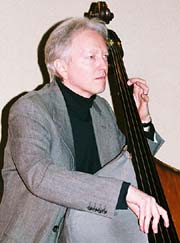
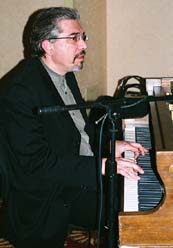
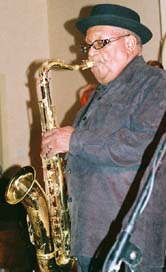
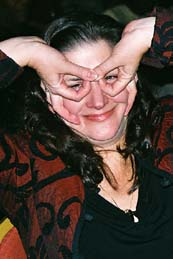
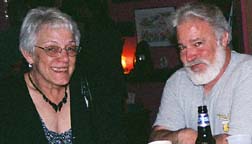
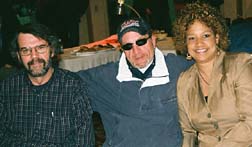
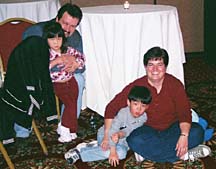
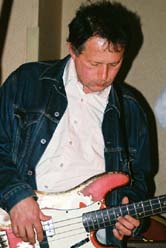
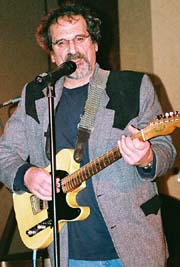
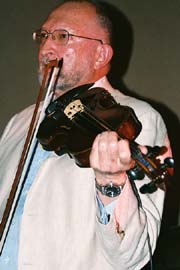
Dave Boye
Charlie Burton
Dave Fowler
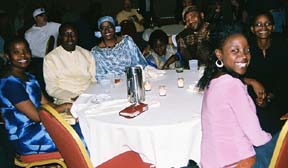
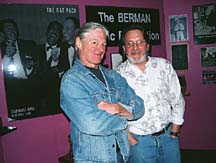
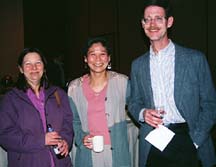
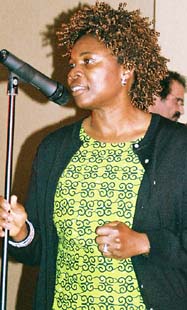
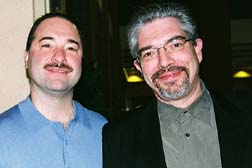
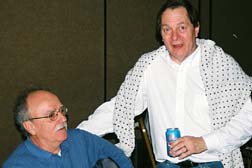
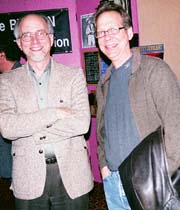
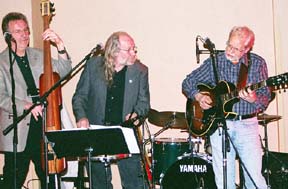
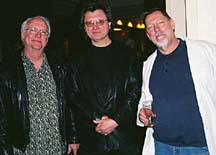
![Butch and Grace celebrate New Year's Eve 2001 [File Photo]](media/608butchgrace102.jpg) Seven
years ago, I met Butch at his house on a
blind date. We were two different people
from separate worlds. Butch, a hip
musician, was witty and funny. On the
other hand, I was a rather serious and
up-tight woman from Africa. We seemed so
different and yet it was easy for me to
fall in love with him. I found him
extremely honest and open about his
lifestyle and who he was, and he was not
defensive about the decisions and
choices he made. It was very refreshing
to hear such honesty from someone I had
just met. I immediately felt safe with
him and soon discovered that we both had
a passion for great music and much more.
And so began our wonderful love affair.
Seven
years ago, I met Butch at his house on a
blind date. We were two different people
from separate worlds. Butch, a hip
musician, was witty and funny. On the
other hand, I was a rather serious and
up-tight woman from Africa. We seemed so
different and yet it was easy for me to
fall in love with him. I found him
extremely honest and open about his
lifestyle and who he was, and he was not
defensive about the decisions and
choices he made. It was very refreshing
to hear such honesty from someone I had
just met. I immediately felt safe with
him and soon discovered that we both had
a passion for great music and much more.
And so began our wonderful love affair.
![Butch and Grace [File Photo]](media/608butchgrace2.jpg) Let me
seize this moment to talk about the life
of the man I love, his love for music
and vision to promote unique forms of
music. Butch worked relentlessly,
locally and across the nation, producing
records with great artists who otherwise
may not have been able to afford to cut
a record. He sponsored live performances
locally in venues like the Zoo bar, P.O.
Pears and the Lied Center for Performing
Arts, to mention a few, and in other
parts of this country. The details about
the work he has done are well documented
on the BMF website. He wanted to educate
people about the great music this
country has to offer, the kind of music
that may not be at the top of the charts
or be played on the popular radio
stations. He spent countless hours
collecting great records and succeeded
in collecting an impressive array of
musical gems. He was not only
enthusiastic about finding new music,
but generously wanted to share this
music with whoever was interested in
listening to it.
Let me
seize this moment to talk about the life
of the man I love, his love for music
and vision to promote unique forms of
music. Butch worked relentlessly,
locally and across the nation, producing
records with great artists who otherwise
may not have been able to afford to cut
a record. He sponsored live performances
locally in venues like the Zoo bar, P.O.
Pears and the Lied Center for Performing
Arts, to mention a few, and in other
parts of this country. The details about
the work he has done are well documented
on the BMF website. He wanted to educate
people about the great music this
country has to offer, the kind of music
that may not be at the top of the charts
or be played on the popular radio
stations. He spent countless hours
collecting great records and succeeded
in collecting an impressive array of
musical gems. He was not only
enthusiastic about finding new music,
but generously wanted to share this
music with whoever was interested in
listening to it. ![Butch and Grace in Chicago 2003 [File Photo]](media/608butchgrace603.jpg) The BMF
intends to keep his vision alive and I
would like to invite all of you to join
us in this effort because, with your
support, together we can accomplish a
lot. We will dedicate our efforts to
promoting music education and live
performances. We have an immense
opportunity to take Butch’s vision to a
different level.
The BMF
intends to keep his vision alive and I
would like to invite all of you to join
us in this effort because, with your
support, together we can accomplish a
lot. We will dedicate our efforts to
promoting music education and live
performances. We have an immense
opportunity to take Butch’s vision to a
different level.![Butch and Sheila Jordan in 2003 [File Photo]](media/608butchjordan.jpg) Butch
loved musicians and was respectful of
their individual talents. He understood
how much work and dedication it took to
be good. He always advocated for the
better treatment of musicians, and
insisted that they be paid better. He
was a good host and went out of his way
to make sure they were comfortable. He
would always take them out to dinner
before or after gigs. Most of all, the
musicians were amazed at his hospitality
and generosity. Once during dinner with
singer Sheila Jordan, she said, “I have
never been treated so well in my musical
career. Butch, you are the first sponsor
that ever took me out to dinner.” When
Butch passed away, Alaadeen, a horn
player from KC, sent me a card that
said, “The music family has lost a great
man.”
Butch
loved musicians and was respectful of
their individual talents. He understood
how much work and dedication it took to
be good. He always advocated for the
better treatment of musicians, and
insisted that they be paid better. He
was a good host and went out of his way
to make sure they were comfortable. He
would always take them out to dinner
before or after gigs. Most of all, the
musicians were amazed at his hospitality
and generosity. Once during dinner with
singer Sheila Jordan, she said, “I have
never been treated so well in my musical
career. Butch, you are the first sponsor
that ever took me out to dinner.” When
Butch passed away, Alaadeen, a horn
player from KC, sent me a card that
said, “The music family has lost a great
man.”![Butch and Grace in California in 2003 [File Photo]](media/608butchgracesf05.jpg) Above
all, he was always very attentive and
loving to me, never missing a chance to
show me or tell me how much he loved me.
We had a lot of fun being together and
creating memories that I will forever
cherish. Our goal was to listen to every
record he had and watch all the movies
in his collection. We could not
accomplish that goal, but we sure had a
lot of fun trying. Living with Butch was
an American cultural experience. For a
girl from Africa, it was the class room
I never could have dreamed of.
Above
all, he was always very attentive and
loving to me, never missing a chance to
show me or tell me how much he loved me.
We had a lot of fun being together and
creating memories that I will forever
cherish. Our goal was to listen to every
record he had and watch all the movies
in his collection. We could not
accomplish that goal, but we sure had a
lot of fun trying. Living with Butch was
an American cultural experience. For a
girl from Africa, it was the class room
I never could have dreamed of.
![Dan Thomas [Courtesy Photo]](media/608jazzjunethomas.jpg) As
always, the free concerts begin at 7
p.m. every Tuesday in June on the plaza
west of the Sheldon Museum of Art at 12th
and R streets on the University of
Nebraska-Lincoln campus.
As
always, the free concerts begin at 7
p.m. every Tuesday in June on the plaza
west of the Sheldon Museum of Art at 12th
and R streets on the University of
Nebraska-Lincoln campus. ![The Dynamic Les DeMerle Band [Courtesy Photo]](media/608jazzjunedemerle.gif) New
to the BMF—and to Jazz in June—is The
Dynamic Les DeMerle Band, a group that
Butch Berman first heard at his bedside
while still in the hospital after a
seizure in early October. He was so
impressed by the band that he wrote a
review of its CD “Cookin’ at the Corner,
Vol. 2” (click
here) and made his pitch to bring
the band to the Jazz in June stage.
New
to the BMF—and to Jazz in June—is The
Dynamic Les DeMerle Band, a group that
Butch Berman first heard at his bedside
while still in the hospital after a
seizure in early October. He was so
impressed by the band that he wrote a
review of its CD “Cookin’ at the Corner,
Vol. 2” (click
here) and made his pitch to bring
the band to the Jazz in June stage.![Darryl White [Courtesy Photo]](media/608jazzjunewhite2.jpg) Darryl
White, professor of trumpet at the
University of Nebraska-Lincoln since
1997, will make his first Jazz in June
appearance as a leader since 2003 (for a
review of that performance
click
here). He will be accompanied by a
diverse group of top-flight
players—saxophonist Dave Pietro, pianist
Jeff Jenkins, bassist Craig Akin,
drummer Brandon Draper and percussionist
Michael Pujado.
Darryl
White, professor of trumpet at the
University of Nebraska-Lincoln since
1997, will make his first Jazz in June
appearance as a leader since 2003 (for a
review of that performance
click
here). He will be accompanied by a
diverse group of top-flight
players—saxophonist Dave Pietro, pianist
Jeff Jenkins, bassist Craig Akin,
drummer Brandon Draper and percussionist
Michael Pujado.
![Kay Davis, Tony Rager, Andrienne Wilson, Norman Hedman and Grace Sankey-Berman at Norman's apartment [Photo by Tom Ineck]](media/608nycnorman.jpg) So
it was with mixed sadness and hopeful
anticipation that an entourage of BMF
associates traveled to New York—sadness
that Butch was unable to join us and
hope that Norman would soon show signs
of recovery after treatment for acute myelogenous
leukemia.
So
it was with mixed sadness and hopeful
anticipation that an entourage of BMF
associates traveled to New York—sadness
that Butch was unable to join us and
hope that Norman would soon show signs
of recovery after treatment for acute myelogenous
leukemia. ![Jazz Standard in Manhattan [Photo by Tom Ineck]](media/608nycstandard.jpg) Hedman
was diagnosed with AML in January, while
rehearsing with Alicia Keys for her
upcoming world tour. Since then, he has
been undergoing rounds of treatment at Memorial
Sloan-Kettering Cancer Center.
Hedman
was diagnosed with AML in January, while
rehearsing with Alicia Keys for her
upcoming world tour. Since then, he has
been undergoing rounds of treatment at Memorial
Sloan-Kettering Cancer Center.
![Tropique at Jazz Standard [Photo by Tom Ineck]](media/608nycbenefit1.jpg) Featured
musicians included bassists Ron Carter
and Buster Williams, vibraphonist Joe
Locke, drummers Horacee Arnold and Will
Calhoun, percussionists Ray Mantilla and
Steve Kroon, singer Kendra Shank,
pianist Frank Kimbrough, saxophonist T.K.
Blue, singer Queen Esther Marrow, singer
and flutist Andrienne Wilson, trombonist
Dick Griffin, guitarist B.D. Lenz,
and—of course—members of Norman Hedman’s
longtime band Tropique (music director
Willie Martinez on timbales; Misha
Tsiganov on piano; Alexei Tsiganov on
vibes; Roger Byam and Craig Rivers on
saxophones; Mario Rodriguez on bass; and
Cristian Rivera on percussion). An
online auction was initiated to raise
additional funds.
Featured
musicians included bassists Ron Carter
and Buster Williams, vibraphonist Joe
Locke, drummers Horacee Arnold and Will
Calhoun, percussionists Ray Mantilla and
Steve Kroon, singer Kendra Shank,
pianist Frank Kimbrough, saxophonist T.K.
Blue, singer Queen Esther Marrow, singer
and flutist Andrienne Wilson, trombonist
Dick Griffin, guitarist B.D. Lenz,
and—of course—members of Norman Hedman’s
longtime band Tropique (music director
Willie Martinez on timbales; Misha
Tsiganov on piano; Alexei Tsiganov on
vibes; Roger Byam and Craig Rivers on
saxophones; Mario Rodriguez on bass; and
Cristian Rivera on percussion). An
online auction was initiated to raise
additional funds.![Grace Sankey-Berman, Kendra Shanks, Tony Rager and Kay Davis [Photo by Tom Ineck]](media/608nycbenefit4.jpg) The
contemporary R&B singer Alicia Keys,
though on tour, offered a video salute
to Norman as the event began.
Appropriately, Kendra Shanks and pianist
Frank Kimbrough got the music off to a
start with a stunning ballad rendition
of “Blue Skies.” Then it was time for
Tropique to take the stage.
The
contemporary R&B singer Alicia Keys,
though on tour, offered a video salute
to Norman as the event began.
Appropriately, Kendra Shanks and pianist
Frank Kimbrough got the music off to a
start with a stunning ballad rendition
of “Blue Skies.” Then it was time for
Tropique to take the stage. ![Queen Esther and her band at Jazz Standard [Photo by Tom Ineck]](media/608nycbenefit2.jpg) Taking
the microphone, Martinez paid personal
tribute to Norman, citing their “10 or
12 years and four CDs” together. He
continued simply by introducing Norman’s
love song to his wife, “Michelline.” On
congas, Cristian Rivera paid his own
tribute by sitting in for Norman. The
Mason brothers—Brad on flugelhorn and
Elliott on trombone—joined Tropique for
a rousing rendition of the Juan Tizol
classic “Caravan.” Bringing down the
tempo, Martinez and Wilson crooned “The
Nearness of You” to each other, as Dick
Griffin assisted on trombone.
Taking
the microphone, Martinez paid personal
tribute to Norman, citing their “10 or
12 years and four CDs” together. He
continued simply by introducing Norman’s
love song to his wife, “Michelline.” On
congas, Cristian Rivera paid his own
tribute by sitting in for Norman. The
Mason brothers—Brad on flugelhorn and
Elliott on trombone—joined Tropique for
a rousing rendition of the Juan Tizol
classic “Caravan.” Bringing down the
tempo, Martinez and Wilson crooned “The
Nearness of You” to each other, as Dick
Griffin assisted on trombone.
![An allstar percussion ensemble performs "Afro-Blue" [Photo by Tom Ineck]](media/608nycbenefit3.jpg) performed
with everyone from B.B. King to Bob
Dylan, ranged from the gospel fervor of
“Walk With Me” to the jazz ballad beauty
of “In My Solitude,” which she once
performed with Duke Ellington, to the
funk of “Elijah Rock.”
performed
with everyone from B.B. King to Bob
Dylan, ranged from the gospel fervor of
“Walk With Me” to the jazz ballad beauty
of “In My Solitude,” which she once
performed with Duke Ellington, to the
funk of “Elijah Rock.”![Eldar Djangirov, Joe Locke, Ron Carter and Horacee Arnold [Photo by Tom Ineck]](media/608nycbenefit5.jpg) The
second show began with the all-star
quartet of Joe Locke on vibes, Eldar
Djangirov on piano, Ron Carter on bass
and Horacee Arnold on drums. This
masterful ensemble worked their magic on
such standards as “You Don’t Know What
Love Is” and the Miles Davis classic
“All Blues,” which contained a brilliant
interpolation of “Willow Weep for Me.”
It was a somewhat
mournful
set of tunes, but played with an
abundance of energy, hope and
musicianship.
The
second show began with the all-star
quartet of Joe Locke on vibes, Eldar
Djangirov on piano, Ron Carter on bass
and Horacee Arnold on drums. This
masterful ensemble worked their magic on
such standards as “You Don’t Know What
Love Is” and the Miles Davis classic
“All Blues,” which contained a brilliant
interpolation of “Willow Weep for Me.”
It was a somewhat
mournful
set of tunes, but played with an
abundance of energy, hope and
musicianship.![D-Train Williams sings "Angel of the Night" [Photo by Tom Ineck]](media/608nycbenefit7.jpg) Tropique
took the stage for a series of vocal
guest appearances, first with the
fabulous singer Ada Dyer on “Closer (To
Your Heart),” from the band’s most
recent release, 2006’s “Garden of
Forbidden Fruit.” Wilson returned to
sing “Alone in Love with You” from the
1996 Tropique debut recording, “Healing
Hands.” Finally, D-Train Williams
performed an inspired rendition of
“Angel of the Night,” a tune from
“Forbidden Fruit” that was initially
dedicated to Grace Sankey Berman. At
least for those of us who knew the
connection, it was a very moving
performance.
Tropique
took the stage for a series of vocal
guest appearances, first with the
fabulous singer Ada Dyer on “Closer (To
Your Heart),” from the band’s most
recent release, 2006’s “Garden of
Forbidden Fruit.” Wilson returned to
sing “Alone in Love with You” from the
1996 Tropique debut recording, “Healing
Hands.” Finally, D-Train Williams
performed an inspired rendition of
“Angel of the Night,” a tune from
“Forbidden Fruit” that was initially
dedicated to Grace Sankey Berman. At
least for those of us who knew the
connection, it was a very moving
performance. ![Misha Tsiganov, Buster Williams, B.D. Lenz, T.K. Blue, Wayne Cobham and Will Calhoun [Photo by Tom Ineck]](media/608nycbenefit8.jpg) Another
highlight of the evening was the
performance of “Stolen Moments” by an
ensemble consisting of alto saxophonist
T.K. Blue (formerly known as Talib Kibwe),
guitarist B.D. Lenz, trumpeter Wayne
Cobham, bassist Buster Williams, drummer
Will Calhoun and pianist Misha Tsiganov.
Norman Hedman’s niece, promising rock
and R&B singer Erika Rose, sang a tune
in honor of her beloved uncle.
Another
highlight of the evening was the
performance of “Stolen Moments” by an
ensemble consisting of alto saxophonist
T.K. Blue (formerly known as Talib Kibwe),
guitarist B.D. Lenz, trumpeter Wayne
Cobham, bassist Buster Williams, drummer
Will Calhoun and pianist Misha Tsiganov.
Norman Hedman’s niece, promising rock
and R&B singer Erika Rose, sang a tune
in honor of her beloved uncle.![Singer Erika Rose [Photo by Tom Ineck]](media/608nycbenefit9.jpg) difficult task of assigning the brief
sets, getting everyone on the schedule
without ruffling any feathers. Bravo,
Willie!
difficult task of assigning the brief
sets, getting everyone on the schedule
without ruffling any feathers. Bravo,
Willie!
![Kay Davis, Grace Sankey-Berman, Tom Ineck, Mary Jane Gruba and Tony Rager in New York [Photo by Russ Dantzler]](media/608nyctomfoolery.jpg) While
in this fabulous city, there is no
better guide than 20-year resident Russ
Dantzler. A Lincoln, Neb., native and
longtime friend and consultant for the
foundation, Russ also is a devoted jazz
fan and advocate who has been
manager and publicist for many artists
over the years, including Claude
“Fiddler” Williams, Benny Waters,
Valerie Capers, Houston Person, Earl
May, David “Fathead” Newman and the
Statesmen of Jazz.
While
in this fabulous city, there is no
better guide than 20-year resident Russ
Dantzler. A Lincoln, Neb., native and
longtime friend and consultant for the
foundation, Russ also is a devoted jazz
fan and advocate who has been
manager and publicist for many artists
over the years, including Claude
“Fiddler” Williams, Benny Waters,
Valerie Capers, Houston Person, Earl
May, David “Fathead” Newman and the
Statesmen of Jazz.![Russ Dantzler and Tony Rager on the Staten Island Ferry with the skyline of Manhattan in background [Photo by Tom Ineck]](media/608nyctomfoolery2.jpg) knowledge
of the city, he later led us on a brisk
walking tour through Midtown Manhattan
to a former speakeasy for after-dinner
drinks.
knowledge
of the city, he later led us on a brisk
walking tour through Midtown Manhattan
to a former speakeasy for after-dinner
drinks.![Cafe Loup [Photo by Tom Ineck]](media/608nyctomfoolery3.jpg) We
had chosen to dine here primarily
because of the entertainment,
saxophonist Bob Kindred with Ron Affif
on guitar and Santi Debriano on bass.
The only table left happened to be right
in front of the bandstand! I forget what
I had to eat because I was too busy
listening to the music—which included
dining-friendly renditions of “Smoke
Gets in Your Eyes,” “I’ve Never Been in
Love Before,” and “Moonlight Serenade.”
We
had chosen to dine here primarily
because of the entertainment,
saxophonist Bob Kindred with Ron Affif
on guitar and Santi Debriano on bass.
The only table left happened to be right
in front of the bandstand! I forget what
I had to eat because I was too busy
listening to the music—which included
dining-friendly renditions of “Smoke
Gets in Your Eyes,” “I’ve Never Been in
Love Before,” and “Moonlight Serenade.”![Ron Affif, Santi Debriano and Bob Kindred at Cafe Loup [Photo by Tom Ineck]](media/608nyctomfoolery1.jpg) Between
sets, Kindred visited our table to chat
and extend his condolences on Butch’s
death. The two had gotten to be pretty
good friends during the years that the
BMF covered the Topeka Jazz Festival,
where Kindred was a regular. Kindred’s
wife, the wonderful singer Anne
Phillips, also was at Café Loup that day
to listen to her husband and we had a
chance to visit. Only in New York!
Between
sets, Kindred visited our table to chat
and extend his condolences on Butch’s
death. The two had gotten to be pretty
good friends during the years that the
BMF covered the Topeka Jazz Festival,
where Kindred was a regular. Kindred’s
wife, the wonderful singer Anne
Phillips, also was at Café Loup that day
to listen to her husband and we had a
chance to visit. Only in New York!![Chico O'Farrill Afro-Cuban Jazz Orchestra at Birdland [Photo by Tom Ineck]](media/608nyctomfoolery4.jpg) After
that disappointing diversion, I was
ready for more live jazz, so we made our
way to Russ’s apartment to catch a bite
to eat before the two-minute walk to
Birdland. The Chico O’Farrill Afro-Cuban
Jazz Orchestra was holding court, as it
does every Sunday night when it isn’t on
the road. Directed by pianist Arturo
O’Farrill since his father’s death in
2001, the 19-piece band is a genuine
Afro-Cuban powerhouse.
After
that disappointing diversion, I was
ready for more live jazz, so we made our
way to Russ’s apartment to catch a bite
to eat before the two-minute walk to
Birdland. The Chico O’Farrill Afro-Cuban
Jazz Orchestra was holding court, as it
does every Sunday night when it isn’t on
the road. Directed by pianist Arturo
O’Farrill since his father’s death in
2001, the 19-piece band is a genuine
Afro-Cuban powerhouse.![Workers remove ice at Rockefeller Plaza [Photo by Tom Ineck]](media/608nyctomfoolery6.jpg) On
a sunny Monday morning, we ventured out
on our own to Rockefeller Plaza for some
shopping. As if to remind us again of
spring’s arrival, tulips were in bloom
everywhere and a work crew was removing
the ice from the world-famous skating
rink for another year. Heading north, we
spent much of the afternoon strolling
through Central Park, where the grass
was a vibrant green, the trees and
bushes were budding and the squirrels
were feasting and fattening on horded
nuts.
On
a sunny Monday morning, we ventured out
on our own to Rockefeller Plaza for some
shopping. As if to remind us again of
spring’s arrival, tulips were in bloom
everywhere and a work crew was removing
the ice from the world-famous skating
rink for another year. Heading north, we
spent much of the afternoon strolling
through Central Park, where the grass
was a vibrant green, the trees and
bushes were budding and the squirrels
were feasting and fattening on horded
nuts.
![Ruth Thone [Courtesy Photo]](media/608thone.jpg) “Ah,
sweet mystery of life,” some wise man
wrote. I suspect that “sweet mystery” is
about death.
“Ah,
sweet mystery of life,” some wise man
wrote. I suspect that “sweet mystery” is
about death.